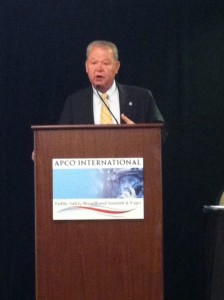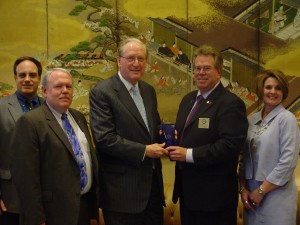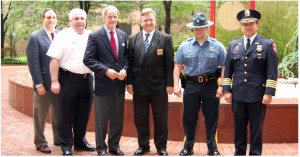APCO International Goes to the Hill

Andrew Seybold addressed attendees of APCO's first Broadband Summit, May 17, on the subject of LTE, "probably the most complex technology that's ever been invented."
“LTE should not be scary for public safety,” said Todd Harrod, manager of solutions architecture for Alcatel Lucent, on day 2 of APCO International’s first Public Safety Broadband Summit. The Summit, held May 16-18 in Washington, D.C., drew about 200 attendees. During the three-day event, leaders from the public and private sectors, as well as public safety technologists and innovators planning and deploying mission-critical broadband networks, discussed LTE, broadband and the merits of S.28 and H.R.607, legislation that would reallocate D Block spectrum to public safety.
APCO spokesperson Sean Kirkendall says, “Aggregation of the 10 MHz that comprise the D Block with the 10 MHz public safety currently holds is crucial, because the spectrum bands are complementary.”
Andrew M. Seybold was the first speaker Tuesday morning, May 17. He gave a high level overview of LTE, offering a side-by-side comparison of common land mobile radio terminology with new LTE terms to offer a relational view of the two technologies. “Broadband is going to give eyes to the people in the street, let them see what’s going on,” Seybold said.
Situational awareness and the chance to enhance the decision-making process are some of the possibilities broadband offers. One law enforcement officer said he’d like to be able to view live video from an in-car camera during hot pursuits so supervisors can make better informed decisions on whether to advise officers to continue or break off pursuit. Another participant said he’d like to be able to use video and GPS to help with sniper calculations and to discriminate friendlies from suspects.
“The goal is for emergency responders from anywhere in the world to step off a plane and their technology, their device will work,” said Gavin Hayes, president of APCO Canada. Hayes was part of a panel discussion that focused on the important role partnerships will play in building out a national public safety broadband network. Representatives from utilities and British APCO also discussed the need for partnerships, indicating that it’s highly unlikely that public safety would build out the network on its own.

APCO representatives presented Sen. Jay Rockefeller with the Leadership in Legislative Service Award in his office. From left: APCO Deputy Executive Director Mark Cannon, APCO Past President Richard Mirgon, Sen. Jay Rockefeller, First Vice President Gregg Riddle and APCO Western Regional Representative Gigi Smith.
All the speakers stressed that although a converged network—voice, video and data—is the ultimate goal, legacy systems will be mission critical for years to come. None of the commercial carriers anticipate that voice over broadband or broadcast capability (one to many) will be public safety ready for several years.
Sen. Jay Rockefeller (D-W.Va.) is a true champion for public safety and has introduced S.28, the Public Safety Spectrum and Wireless Innovation Act, in the Senate Committee on Commerce, Science, and Transportation, which he chairs. The act would reallocate the D Block to public safety and provide the funding to build out the national broadband network. On Tuesday night, APCO presented the senator with its Leadership in Legislative Service Award for his commitment to get this legislations passed this year.
In a videotaped acceptance speech, Rockefeller said, “Tractors are going to have to roll over me to prevent me from getting [this legislation] passed. … It’s a win for all states and a win for public safety. … This is my top legislative priority for the Commerce Committee.”
Also honored at the Leadership in Policy Awards Dinner on May 18 were:
- Gregory Schaffer, assistant secretary, Office of Cybersecurity and Communications, U.S. Department of Homeland Security, who received the Leadership in Advancing Communications Policy Award;
- Patrick Donovan, attorney-advisor, Policy Division, Federal Communications Commission, who received the Leadership in Regulatory Service Award; and
- William J. McCammon, executive cirector, East Bay Regional Comm Systems Authority, who received the Leadership in Advocacy Award.
On Wednesday, APCO First Vice President Gregg Riddle, Immediate Past President Dick Mirgon, Deputy Executive Director Mark Cannon and Western Regional Representative to the Board of Directors Gigi Smith met with Sen. Rockefeller in his office to discuss S.28 and deliver the award to him in person.
Rockefeller said it’s critical for members of the public safety community to reach out to their senators and representatives and ask them to support this legislation and the allocation of the D Block to public safety. “They have to know they might not get it,” he said. “This is a real dogfight.”
Other Summit participants also spent the day on Wednesday meeting with their members of Congress and staff members to ask for their support.

On May 16, APCO International and public safety representatives met with U.S. Senator Tom Carper to gain his support for D Block legislation. From left: APCO Deputy Executive Director Mark Cannon; David Roberts of the New Castle County Fire Service; Sen. Tom Carper; APCO President Bill Carrow; Sgt. Paul Shavack, Delaware State Police director of Public Information; and Colin Faulkner, former Kent County director of Public Safety.
The legislation needs your support too. Call, e-mail and write your U.S. senators today to strongly urge them to cosponsor S. 28, the Public Safety Spectrum and Wireless Innovation Act of 2011. Call, e-mail and write your U.S. House Representative today to strongly urge them to cosponsor H.R. 607, the Broadband for First Responders Act of 2010. You can find sample letters, telephone scripts and statements of support at http://psafirst.org/take-action.
About the Author
Keri Losavio is editor of APCO International’s Public Safety Communications magazine. Contact her via e-mail at losavik@apcointl.org.

